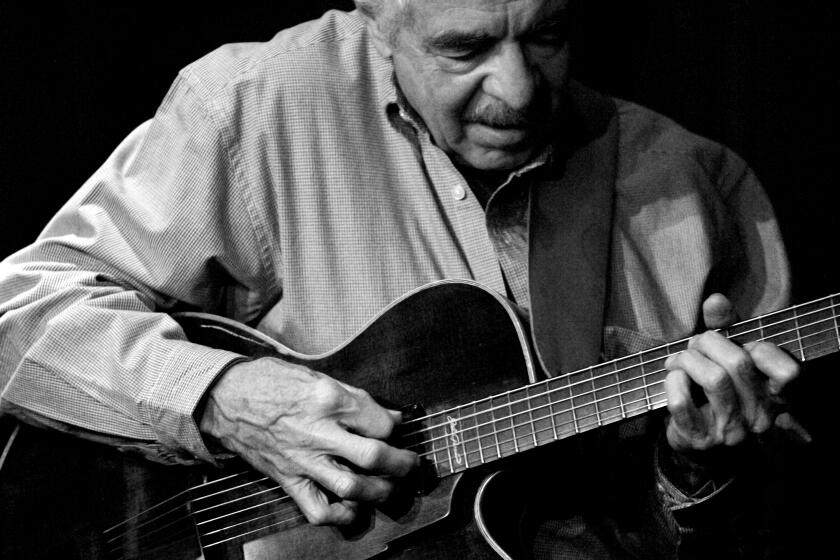Her Heart Will Go On, Minus 1
If the Bible had customized the Lord’s Prayer to the plight of pop music critics, one verse surely would have read, “And deliver us from divas.”
Tonight my prayer is being answered. Celine Dion will bestride the Pond like an ironclad, golden-throated colossus, but I won’t be there, thank God.
Her tour hit Los Angeles first on Wednesday night,, and that meant some other unlucky Times’ critic had to walk through the valley of the shadow of lack of depth.
By my definition, a diva is a performer with prodigious natural talent who, when posed that conundrum “Is it the singer or the song?” finds no complexity in the question. The diva and her retinue answer that obviously it’s the voice that matters, not the material.
Divas stand atop a song as a statue on a pedestal. Music and lyrics are there to prop up the singer for the showiest display. Hence, the blander and more formulaic the writing, the more cliched the production, the more swollen the dynamic and one-dimensional the sentiment, the better.
No use throwing in any surprising turns or subtle points of interest--such as inventive, figurative language and detailed characterizations and descriptions that might make the listener think of real people and their experiences, rather than grandly talented singers and their titanic agendas.
In diva fodder, a generic, featureless “I” sings greeting-card rhymes about being in love with, or falling out of love with, a generic, featureless “you.”
Mine is decidedly a minority view.
Billboard magazine recently reported that Dion’s record company, Sony, claims her worldwide album sales stand at 60 million over the past 2 1/2 years, not counting an additional 25 million copies of the “Titanic” soundtrack featuring her rendition of the love theme “My Heart Will Go On.”
The careers of Whitney Houston and Michael Bolton, this decade’s other leading divas (yes, men can fit the definition), are further evidence that nobody goes broke pumping up songs to statuesque scale.
Clearly, a large swath of humanity has a taste for the grand, the prodigious, the larger-than-life, whether it be singers, movies or fireworks displays.
For me, powerful singers are like power pitchers in baseball. Some, like Dion, Houston and Bolton, throw every ball right down the middle in a straight line, with everything they’ve got. Such pitchers often get clobbered.
The winners can make a pitch rise or dip or tail off as it approaches the plate. They change speeds, hit the corners, and multiply the impact of their natural throwing ability by unleashing the element of surprise.
For me, singers who can get that kind of movement on the ball are, well, moving. There’s a complex emotional spin involved in great singing, an ability to convey feelings that conflict, a way of singing one thing, and simultaneously hinting that there’s more to the matter than what the lyric says.
The great singers show us that the truth isn’t easily described and that it lies in the gaps between the words. They let us hear and comprehend what Van Morrison, one of the greatest, once called “the inarticulate speech of the heart.”
One of my favorite recordings is Aretha Franklin’s version of “I Say a Little Prayer,” by Burt Bacharach and Hal David. Franklin chose a piece that places a heart in an intimate and highly specific setting: we observe a woman as she goes through her daily routine, overhearing her thoughts about a lover. (“The moment I wake up, before I put on my makeup, I say a little prayer for you / I’m combing my hair now, and wondering what dress to wear now . . . “).
You won’t find that kind of specificity in any pedestal-standing diva’s song. Too much distraction from The Singer. And you won’t find the emotional complexity Franklin achieves by taking a stock chorus phrase, “I will love you forever and ever,” and piling it with feelings of hope, celebration, determination, doubt, desperation and a wounded knowledge that “forever and ever” is a tough order.
When Dion and her diva peers open their mouths, I might be impressed, but I’m never moved. I don’t hear anything that rings true to my experience of emotions being mixed and complex, not simple and monolithic.
I just don’t believe them.
Sure, Celine Dion’s heart will go on; nothing in her powerhouse reading of that glitzy “Titanic” theme indicates it comprehends what a soul-pulverizing, enraging experience it might be to watch the love of your life become fish food.
But in the diva business, it’s immaterial what a real person enmeshed in the song’s scenario might be experiencing; we’re simply supposed to be swept away with the power and the glory of it all.
Let Dion’s stately, unsinkable ship carry on with 60 million fare-paying passengers loving the cruise. I’m pleased to be the man overboard.
More to Read
The biggest entertainment stories
Get our big stories about Hollywood, film, television, music, arts, culture and more right in your inbox as soon as they publish.
You may occasionally receive promotional content from the Los Angeles Times.







